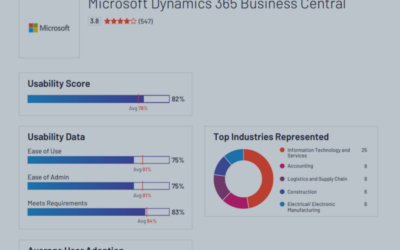Transitioning from on-premises to cloud ERP brings a lot of benefits, including consistent and fast updates that reduce impact on end users, increased agility, and APIs to other solutions. When making the switch, however, is there a best way to do it? Here are some tips that can help make your cloud ERP migration as easy as possible for your business.
Ask and Assess: How Ready is Your Company for the Cloud?
As a first step, ask yourself: How ready is your team for the cloud? This may seem like a simple question, but it is more complex than you might think. Beyond having the right hardware on hand, you need to assess whether your company is culturally ready for the transition.
What is your company’s internal culture around remote work or collaborating in the cloud? Is your team ready to transition to working in a virtual, shared space? If resistance exists, consider what steps you can take to encourage enthusiastic adoption during the transition. Make sure that your C-suite and managers are onboard, and make sure that your reasons for transitioning are disseminated to your entire team.
Process Mapping
When transitioning into the cloud, understand it is not simply a matter of replicating your current processes and implementing them in the cloud. It should involve a careful assessment of your processes, identifying which are most important, and then redesigning these to function optimally in a cloud. It will take time. But this upfront work will make your migration faster, more efficient, and easier for your employees.
Develop and Use a Change Management Plan
A change management plan is a must-have during your cloud ERP migration. It is the best way to manage the process while also implementing controls of cost, schedule, and scope. It will also help you successfully manage all communications with your team about the change. An effective change management plan minimizes the impact your transition to the cloud will have on your business and your employees.
A Data Migration Strategy
As anyone who has ever gone through a cloud ERP migration where they moved from one ERP system from another can tell you, data migration is often the most complex piece. Redundant or dirty data can mean you end up with a new ERP as bloated as your legacy one was. Divide and conquer with your data migration strategy. Assign responsibility for cleaning data and eliminating redundancies to key stakeholders in each department. That way, you will start anew in the cloud with clean data, which makes tasks like financial management in the cloud much easier.
Working with the Right Partner
Finally, make sure you work with the right partner on your cloud ERP migration. The best ERP partners will leverage their experience with migrations to provide you with best guidance and information at every step along the way, foreseeing trouble and helping you deal when the unexpected happens. Not sure how to identify the right ERP partner? Here are some tips.
When you switch from on-premises to cloud ERP, you are opening up a world of possibilities for your business, including reduced operational costs and increased productivity. By taking the best steps in preparation, you can ensure a seamless transition. If you have your own feedback on the transition to cloud ERP, let us know all about it in the comments above. If you want to take the first step toward cloud-based ERP, get to know some of your options.




